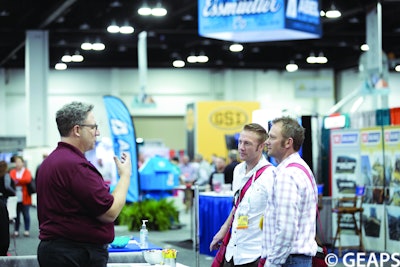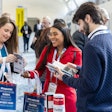
Every year, companies must determine how best to spend their budgets, including how to get the most out of their funding for employee professional development.
There are numerous options for professional development: university courses, online learning, in-house training and more. But the most available option in the feed and grain industries are conferences and tradeshows.
I recently recorded a podcast with Adrianne Fjerstad-Miller, conference and expo director, and Betsy Polis, the senior project manager for the Grain Elevator and Processing Society (GEAPS). We discussed why tradeshows offer a unique opportunity that other types of professional development cannot replicate.
Tradeshows let attendees examine products up close and personal
In equipment-heavy industries like feed manufacturing, grain handling and processing, facility managers and employees need to have an opportunity to learn about new equipment, see it firsthand and handle it themselves.
Tradeshows allow attendees to have hands-on experience with the products and equipment. Exhibitors often showcase their latest innovations, allowing attendees to touch, feel, and test the products. This hands-on experience enables attendees to better understand product features, functionalities and quality.
"The biggest thing we hear from our GEAPS board and attendees via surveys is the connections you make in person at an event are so much more valuable than what can be made virtually," said Polis.
Tradeshows also bring together multiple exhibitors and their products under one roof, making it convenient for attendees to compare different options. Attending these shows allows industry professionals to stay up-to-date with the latest trends, advancements and best practices in the field.
"If you were in a classroom setting, there are a lot of people who might have a question, but they feel intimidated to ask it in front of a large group," says Fjerstad-Miller. "Whereas, at a tradeshow, you are just having a one-on-one conversation between you and the vendor. It can be easier for people to get their questions answered in that format."
Taking advantage of unique learning opportunities
Tradeshow education provides employees with access to a wide range of learning opportunities. They can attend workshops, seminars, and presentations conducted by industry experts, thought leaders and professionals.
Employees can also interact with industry peers, exchange ideas and build connections. These interactions can lead to valuable discussions, collaborations and partnerships that can contribute to expanding their industry knowledge.
"I think the spontaneity of what you could learn at a tradeshow is also really cool," says Fjerstad-Miller. "You might sign up for a class, and you know what the topic is, but as you're walking through a tradeshow, you might just stumble upon something that piques your interest. Now you're learning about some product that might be beneficial. You had no clue that day you would glean that knowledge."
Tradeshows often feature experts, consultants and industry veterans who are available for one-on-one consultations or panel discussions. That allows employees who wish to take advantage of these opportunities to seek guidance, ask questions and gain insights from experienced individuals with deep industry knowledge.
"One great thing about tradeshows is you can get more than one opinion," says Polis. "If you're in a classroom, you're usually getting the teacher's position. With tradeshows, you get panels."
In-person tradeshows are back in full swing after the pandemic. Now is a the time to send employees to national and regional shows. An employee's professional development program should comprise many educational opportunities, and tradeshows and conferences should be part of that plan.
.jpg?auto=format%2Ccompress&crop=faces&fit=crop&h=48&q=70&w=48)


















